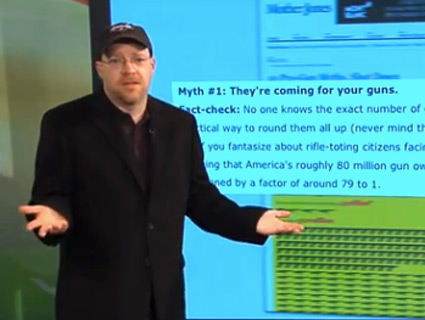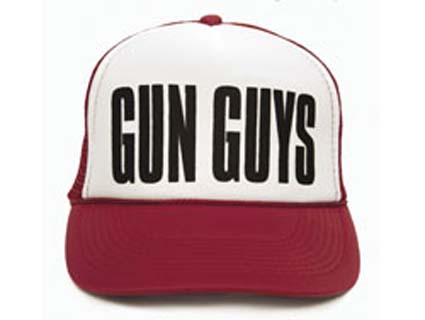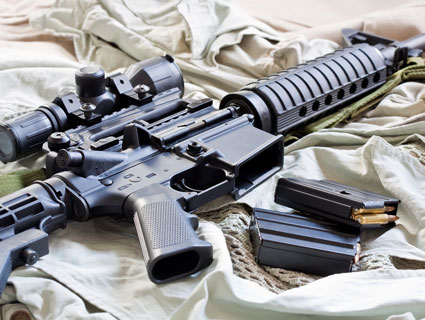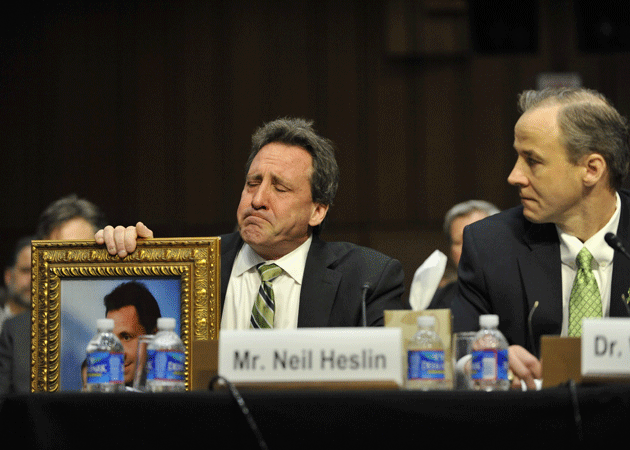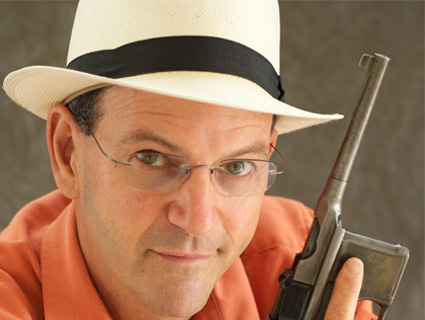
Author Dan Baum.DanBaum.com
Dan Baum is a self-professed “weirdo hybrid“—a card-carrying liberal from suburban New Jersey whose affinity for firearms places him firmly in the opposite camp. For his latest book, Gun Guys: A Road Trip, the former New Yorker scribe embarked on a 15,000-mile cross-country journey to figure out why millions of Americans—himself included—instinctively cling to their guns.
His timing was notable. For this past December, just as Baum’s book was going to press, news began pouring out about a horrific incident at an elementary in Newtown, Connecticut. Months later, Democrats and Republicans are clashing over gun-control at every level of government, and Baum worries that the voices of ordinary gun owners are being tuned out of the debate.
Over a dubious cell-phone connection—Baum was driving in the Montana boonies—the author took me inside the mind of a gun guy as we discussed the lure of the NRA, the left’s screw-ups, the merits of the AR-15, and why the “guns don’t kill people” refrain makes sense—at least to a gun guy.
Mother Jones: You wrote Gun Guys in advance of the mass shootings in Aurora, Oak Creek, Minneapolis, and Newtown. You eventually added a postscript recommending regulations that you thought gun advocates and detractors could agree on. Did you worry that all these horror stories would affect how people received your book?
Dan Baum: I wasn’t so much worried about a backlash. I don’t think Sandy Hook has changed the lives of any of the people in the book other than they feel more beleaguered and more blamed for things like that. I think it’s really destructive that when something like Sandy Hook or Aurora happens, pundits will say the problem in the this country is that we have this terrible gun culture. Any of the people in my book—and frankly me—will say, “Wait, wait, wait! I’m gun culture. I like guns. I buy guns. I shoot guns. Are you saying I am to blame for Sandy Hook?”
What I learned traveling around the country as a liberal Democrat is whoah, there are costs to gun laws and there are even costs to talking about gun laws. When something like Sandy Hook or Aurora happens, the knee-jerk reaction on the left is ban the guns! When you do that, you also alienate the very people who might help us reduce gun violence. They’re the people who know guns, who know how they function, who know how to train people to be around them. If we didn’t have this tribal instinct to vilify the other, we could be doing so much more good.
MJ: In the book, you also talk about the negative names people on the left will often call gun owners. Why do you think so many progressives think it’s okay to talk about gun guys this way?
DB: You will hear people say gun owners are accessories to murder, and it’s just the wrong way to talk about people. I spent my whole life among liberal Democrats who are so achingly careful to say all the right, supportive things about Hispanics, immigrants, gays, transsexuals, and blacks, and they will say the most godawful things about gun owners, calling them “gun nuts” or “penis compensators.” The gun represents a worldview that we on the left do not share. The gun represents individualism over collectivism, American exceptionalism over internationalism. It’s a totem of the other tribe and we don’t like the other tribe. The tragedy is, we seem to think by attacking the totem we’re going to weaken the opposing tribe, but it’s just the opposite. Republicans love it when we do this sort of thing. It’s their best organizing tool. Gun owners are kind of a free-fire zone for lefties.
MJ: Do you think what happened at Newtown will soften gun-rights activists’ absolutist attitudes?
DB: No. In fact I think it’s driven gun guys further into their defensive crouch because of the left’s reaction. The day the Newtown shooting happened, I think every gun guy in America was as horrified as Nancy Pelosi was. Who wouldn’t be? But there is a sense—and I feel it myself—that those who were predisposed to castigate, punish, and vilify gun owners seized the opportunity. This desire to ban assault weapons—it’s hard for me to believe that people think that will make us safer. I don’t see the logic; a lot of gun guys don’t see the logic. So they wonder: Joe Biden and Dianne Feinstein and Charles Schumer must know that this really isn’t going to make us safer. So what are they doing? Why are they doing this? That’s when the resentment comes. If we could have kept our hands off the gun-control trigger a moment longer, we might have actually had the a conversation that would have made us safer, but we blew it.
MJ: The NRA and the gun lobby are opposed to almost all proposals regulating firearms. Do most average law-abiding gun owners share this hard-line mentality?
DB: I personally have met very few gun owners who oppose background checks. But very few of them, even the ones that don’t want an AR-15 with a 30-round magazine, believe that limiting the amount of rounds in a magazine is going to contribute materially to public safety. What worries them is being told you are not to be trusted with these things, and that is really offensive because gun owners derive a tremendous amount of pride from being able to live alongside very dangerous things, use them effectively, and not hurt anyone. When a politician or a pundit who obviously has very little experience or no experience with guns, like Charles Schumer or Dianne Feinstein, says to your ordinary gun owner, “You cant be trusted with more than 10-round magazine,” it really strikes the wrong chord. The bulge of the gun guys demographic is middle-aged, rural white men with some college, and that is a demographic that has been losing ground economically and culturally for the past 30 years. So along comes the NRA with an analysis: You want know why you’re so pissed off? Because the liberals want to take away your guns.
MJ: Did you find any fracture points between the NRA and the gun community at large?
DB: There’s probably 100 million gun owners in the United States. The NRA has 4 million members. Only 4 percent of gun owners belong to the NRA. That’s tiny. The NRA is a catastrophe for the country. It’s a catastrophe for gun owners because the face that the NRA puts on gun owners is an angry, intransigent, male, extremist, frightening scowl. It makes non-gun owners think anyone that owns a gun is that way because they are the only people who speak. It wasn’t always like this. The NRA got taken over in 1977, and used to be a marksmanship and safety organization. This is a relatively recent phenomenon, and it’s a hideous organization. In my view, gun owners need to take it back.
MJ: What would an organization that represents the views of responsible gun owners look like to you?
DB: It would look like the NRA before 1977. I think it’s appropriate for the NRA to be vigilant against gun bans. I began my book-writing career with a book about the drug war, so I have a deep-seated aversion to banning things. I think it’s counterproductive. I think it’s un-American. I think it’s stupid. I would like to see the NRA back to promoting the discipline sport of safe firearms handling and shooting. To tell you the truth, I think shooting is a great sport. It’s a really fun and valuable thing we have in this country, and young people aren’t very interested in it. But man, shooting is a great thing for kids. Shooting is incredibly disciplining.
MJ: FBI data shows that violent crime is declining, yet many of the gun guys you met claim that crime is out of control. Where does this perception come from?
DB: If you think the world is scary place, you’re going to think it regardless of statistics. Part of it may be an old white guy sense that the world is coming apart because old guys used to run the world and now they feel like they run the world no longer. So they just have to believe the chaos is real, and I think that could well be part of it. I think in many cases the desire to carry the gun comes first and later comes the belief that crime is out of control to justify carrying the gun.
MJ: In the wake of Sandy Hook, AR-15 rifles have been flying off the shelves. In your book, you mention that these guns are ubiquitous at shooting ranges and gun stores. What do you think explains its rise in popularity?
DB: There’s a perception in the media that the AR-15 is some kind of weird outlier in gun culture. How many times have you heard since Sandy Hook that nobody needs an AR-15? Well it turns out everyone needs an AR-15; it’s the only gun anyone wants. Have you ever fired one?
MJ: No.
DB: If I put one of those in your hands and you shot at a target you would be awestruck at how well you shot. It’s like a guitar that makes everyone play like Jerry Garcia. It was not a particularly popular gun until the assault rifle ban of 1994. The second thing that made it very popular after the ban was lifted in 2004 was the Iraq War and the war on terror. Everyone has seen these guns a million-billion times because it’s the gun our soldiers and marines use. So we are bathed in free advertising for the AR-15 with all the coverage of the wars. But also, it is enormously popular precisely because it’s just so cool. It shoots so well, it’s lightweight, it has a spring in the butt-stock so you don’t feel much recoil. It’s accurate and modular and it has all those great accessories. It’s just a fucking awesome consumer product. It’s the iPhone of guns. When gun guys hear all this talk, they just don’t get it. They’re like, “Are you kidding me? Everyone needs an AR-15!”
MJ: Did you meet any gun guys who were personally affected by gun violence and changed their views as a result?
DB: Well, no. I think the old cliché is true: A conservative is a liberal who has been mugged. He’s not in the book, but I met a guy who owns a gun store whose daughter killed herself with a gun she stole from his store. He still owns the gun store; it’s not like he sold the store and said “I hate guns.” We talked about it and he said, “My daughter was a very troubled girl.” That was the problem. The gun didn’t kill her; she killed herself with the gun.
MJ: So what do you think about the “Guns don’t kill people” argument?
DB: It’s too bad that became an NRA bumper sticker. It’s easy to dismiss. Gun guys tend to have a very different view of the individual than non-gun people. The gun is about individual empowerment and individual responsibility and individual decision-making and individual sovereignty. In a way, that kind of dovetails with a politically conservative worldview and is kind of anathema to a liberal collectivist worldview. But even beyond the raw partisan politics of it, gun guys really have a lot of respect for the power of the individual to make good and bad decisions. Just handling your gun at the range or in the woods makes you very cognizant of the awesome choices you have when you’re holding the gun. So this line “Guns don’t kill people, people kill people” really makes sense in a deep, deep way. When I’m holding my deer rifle, I could make different choices and do terrible things, and the gun has no idea what I’m doing. The only thing that’s standing between a bunch of sportsmen together at a range enjoying a nice afternoon pursuing their hobby and a mass killing the whole country will be grieving over is the personal choices of the people at the range.
